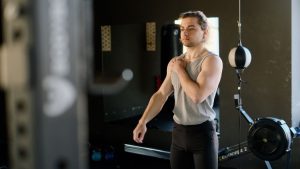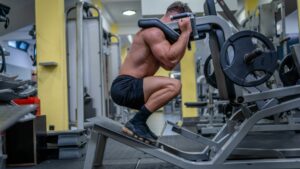Fitness and strength training often come with a whirlwind of expectations, especially when it comes to age-related capabilities. You might find yourself comparing your performance against others, wondering if your struggles are within the realms of normalcy. One common query that arises is, “Should a 21-year-old struggle with a 30kg hack squat?”

Understanding the Hack Squat
The hack squat is a compound exercise that primarily targets the quadriceps, hamstrings, and glutes. It involves a machine where the individual stands at an angle and pushes the weight up and down using their legs. The weight one can handle during a hack squat can vary widely based on several factors.
Individual Differences
Firstly, it’s important to recognize that strength levels can differ significantly from person to person, irrespective of age. Factors such as body weight, prior training experience, genetics, and overall fitness play crucial roles in determining one’s strength capabilities.
Context Matters
When considering a 30kg hack squat, context is key. For some individuals, lifting 30kg might be challenging, while for others, it could be relatively light. The perception of difficulty can vary based on various factors, including:
Fitness Background:
Someone with a background in weightlifting or sports might find a 30kg hack squat easier due to developed muscle strength and familiarity with similar movements.
Physical Fitness:
Individuals who regularly engage in lower body exercises might find the 30kg weight manageable, while those newer to exercising could initially struggle.
Muscle Imbalances or Weaknesses:
Pre-existing muscle imbalances or weaknesses could influence an individual’s ability to lift a particular weight, irrespective of age.
Age and Strength
Age alone isn’t a definitive factor in determining strength levels. While younger individuals might generally have higher recovery rates and potentially faster muscle growth due to hormonal factors, there isn’t a universal standard for strength at a particular age.
Should a 21-Year-Old Struggle?
There’s no ‘should’ or ‘shouldn’t’ when it comes to individual capabilities in the gym. It’s essential to focus on personal progress, incremental improvements, and staying consistent with training rather than comparing oneself to arbitrary standards.

Tips for Progress
Gradual Increases: Incrementally increasing weight while ensuring proper form can help in gradually building strength.
Balanced Training: Incorporating exercises that target various muscle groups can prevent weaknesses and aid overall strength development.
So.
Struggling with a 30kg hack squat at 21 isn’t uncommon and doesn’t signify a lack of ability or progress. It’s crucial to listen to your body, stay consistent, and focus on gradual improvements rather than fixating on arbitrary weight standards.
Remember, everyone’s fitness journey is unique, and progress comes in various forms. Embrace the process, celebrate small victories, and keep challenging yourself within safe and comfortable limits.
Let’s delve further into understanding the nuances of strength training and how age can play a role in one’s fitness journey.
Age and Fitness Progression
While age isn’t a direct determinant of strength, it can influence certain aspects of fitness. In our early 20s, our bodies are generally more resilient and responsive to exercise due to higher levels of growth hormone and testosterone. This can contribute to quicker muscle growth and recovery.
However, individual factors like lifestyle, nutrition, sleep, and consistency in training play pivotal roles in maximizing one’s potential, regardless of age.
Overcoming Challenges
If a 21-year-old finds a 30kg hack squat challenging, it’s an opportunity to explore various aspects that might be hindering progress:
Form and Technique:
Ensuring proper form during exercises is crucial for targeting the intended muscles and preventing injury. Seeking guidance from a trainer or using resources to perfect form can make a significant difference.
Progressive Overload:
Consistently challenging oneself by gradually increasing weight or repetitions is fundamental for muscle growth and strength development. However, it’s crucial to do this safely and progressively.
Rest and Recovery:
Adequate rest between workouts is essential for muscles to repair and grow stronger. Overtraining or insufficient rest can hinder progress.
Nutrition:
A well-balanced diet with sufficient protein intake aids muscle recovery and growth. Ensuring the body gets the necessary nutrients is crucial for optimal performance.
Setting Realistic Expectations
It’s vital to set realistic and individualized goals rather than comparing oneself to others. Progression in fitness is nonlinear, and everyone has their unique pace. Celebrate personal achievements and focus on gradual improvements rather than fixating on arbitrary benchmarks.
Conclusion
Struggling with a 30kg hack squat at 21 isn’t a cause for concern. Fitness journeys are highly personal, and challenges along the way are part of the process. Embrace the learning curve, stay consistent, and focus on sustainable progress.
Remember, age is just one aspect of the bigger picture. Dedication, proper training, and a positive mindset are key to achieving fitness goals at any age.
External Resources:
If you’re seeking more guidance on strength training and overcoming challenges:
Men’s Health – Common Mistakes That Hinder Leg Day Progress
Shape – The Benefits of Compound Exercises for Strength Building
Verywell Fit – How to Incorporate Progressive Overload in Workouts
Bodybuilding.com – Hack Squat Exercise Guide
Muscle & Fitness – 10 Best Exercises for Building Leg Muscles
American Council on Exercise – Strength Training 101
Remember, your journey is about progress, not perfection. Keep pushing forward, and most importantly, enjoy the process!
Every step you take in your fitness journey contributes to your growth. Stay motivated, stay consistent, and enjoy the incredible journey toward strength and wellness.
Comparison tabular
| Factors | Influence on Performance |
|---|---|
| Fitness Background | Individuals with prior weightlifting or sports experience may find the 30kg weight more manageable due to developed muscle strength and familiarity with similar movements. Those newer to exercising might initially struggle. |
| Physical Fitness | Regular engagement in lower body exercises may make the 30kg weight more manageable, while newcomers might find it challenging initially. |
| Muscle Imbalances | Pre-existing imbalances or weaknesses can impact one’s ability to lift a particular weight, regardless of age. |
| Age and Strength | While younger individuals might generally experience faster muscle growth due to hormonal factors, age alone isn’t a definitive factor in determining strength levels. |
| Form and Technique | Proper form is crucial for effective muscle engagement and injury prevention during exercises like hack squats. |
| Progressive Overload | Gradually increasing weight or reps is vital for muscle growth and strength development, done safely and progressively. |
| Rest and Recovery | Adequate rest between workouts is essential for muscle repair and growth. Overtraining can hinder progress. |
| Nutrition | A well-balanced diet with sufficient protein aids muscle recovery and growth. Proper nutrition is crucial for optimal performance. |
| Setting Realistic Goals | Focusing on individualized, achievable goals rather than comparing oneself to others’ achievements is key to a positive mindset and sustained progress. |
Understanding these factors can help navigate challenges and create a personalized approach to strength training, emphasizing gradual improvement and overall fitness rather than fixating on a specific weight or age-related benchmarks.
Wrapping up
In the world of fitness, the journey is as crucial as the destination. Struggling with a 30kg hack squat at 21 isn’t a roadblock; it’s a stepping stone. Embrace the challenges, for they sculpt your strength, determination, and resilience.
Remember, fitness isn’t a race against time or against others it’s a personal expedition toward becoming the best version of yourself. Your body’s response to exercise is unique, influenced by various factors beyond age.
Celebrate small victories, focus on gradual improvements, and relish the joy of progress. Seek guidance, refine techniques, and nourish your body well. But most importantly, enjoy the process.
Fitness isn’t just about lifting weights; it’s about lifting spirits, boosting confidence, and nurturing a healthy lifestyle that extends beyond the gym. Your journey is yours alone, and every step is a testament to your dedication and perseverance.
So, let the weight on the bar be a challenge you willingly face, a goal you progressively conquer. Strive not for perfection, but for progress. Stay dedicated, stay consistent, and revel in the incredible transformation you’re crafting, one squat at a time.
Keep lifting, keep growing, and above all, keep believing in the power of your journey toward a stronger, healthier you.

Hey there, it’s Mike Rrsq, the Editor-in-Chief over at Jsquat.com, and I’m absolutely obsessed with all things squat fitness! I’ve been lucky enough to get some serious recognition for my work in this field. With a solid background in the fitness and wellness industry, I’ve been there right from the get-go, helping shape this website into what it is today.
You see, I’m not just the boss around here; I’m also a passionate contributor. I love sharing my insights through my articles, and trust me, they’re not your run-of-the-mill stuff. Each piece I write is a labor of love, filled with my expertise and real-world experience in the fitness universe. So, if you’re into fitness and looking for some inspiration, you’re in the right place!
Related Posts
- Should a 18-year-old struggle with 30kg hack squat
The ability to handle a 30kg hack squat can vary widely among 18-year-olds. Factors like…
- Should a 17-year-old struggle with 30kg hack squat
It's VERY important to approach weightlifting with care, especially when dealing with heavier loads like…
- Should a 22-Year-Old Struggle with a 30kg Hack Squat
When it comes to weightlifting, the journey is as unique as the individual embarking on…
- Should a 19-Year-Old Struggle with 30kg Hack Squat
As a 19-year-old navigating the world of fitness, it's common to question your abilities, especially…
- The 21-Year-Old Struggle: Understanding the 70kg Back Squat
At 21, the world feels both boundless and challenging. Amidst this whirlwind, fitness often finds…
- Should a 23-Year-Old Struggle with a 40kg Hack Squat
When it comes to fitness, we often find ourselves comparing our progress to others, wondering…
- Should 19-Year-Old Struggle with a 90kg Back Squat
At 19, the world can feel like both an open playground and a daunting challenge.…
- Should a 20-Year-Old Struggle with 70kg Back Squat
At 20, navigating the realm of fitness and strength training can be both exhilarating and…
